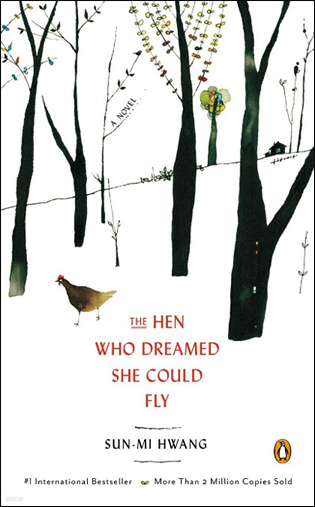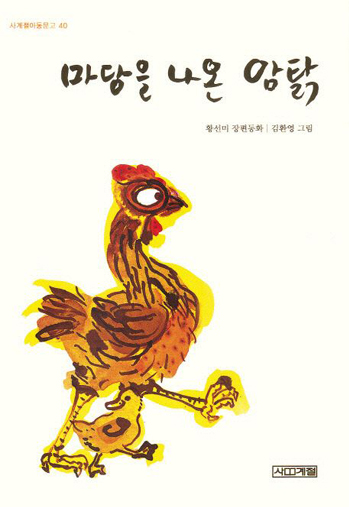|
I Read
The Hen Who Dreamed She Could Fly by Hwang Sun-mi
2023.07.03
This article is a review written by a Filipino reader of
I encountered K-Book Trends on Instagram. I immediately browsed it. Looking at the Interview menu, I searched particularly for Ms. Hwang Sun-mi, the author of The Hen Who Dreamed She Could Fly (SAKYEJUL), the only Korean literature book I have read so far. In her interview, she said, “I hope they think reading a book is like practicing a certain wish.” What she uttered is so true and meaningful because after reading The Hen Who Dreamed She Could Fly, I was in deep thought and felt a sense of achievement. Like I have reaped a certain reward. It encouraged me to share my perspectives on the story. Coincidently, in her interview, I also found out about her passion for plants, and I thought perhaps that is the reason why she named the main character Sprout in her book The Hen Who Dreamed She Could Fly.
* K-Book Trends Vol. 47 – Go to the interview with writer Hwang Sun-mi
English and Korean covers of The Hen Who Dreamed She Could Fly
A single word to describe this book is superb. This beautiful book earned prestigious awards and captivated many readers' hearts, especially children. The Hen Who Dreamed She Could Fly is the story of Sprout, a hen trapped in a coop inside a farm shed. She yearns to be free and dreams of raising a child. Her chance at freedom arrives when she is taken out for culling. But life outside the cage isn’t quite what she expected. Dangers abound because of the predatory weasel and the cold attitude of the other animals on the farm. The climax of the story comes when she discovers an egg left unattended in a nest. Unable to lay any herself, she decides to hatch it. With the help of her friend Straggler, she successfully watches over the fragile egg until the creature inside emerges. There she can finally call herself a mother, and she is determined to take care of her child. There are a lot of twists in the story, which makes it very entertaining and enchanting to read.
“Sprout was the best name in the world.” This scene in the book reminds me of the phrase, “How sweet thy name is to be called.” Our name is our identity. It feels good to be called by our name. Generally, our name is given to us for a reason and meaning. The name Sprout encompasses the personality the main character needs when she encounters life in the following chapters of the book. That sprout needs to be strong and never give up, just like a sprout is vital.
“Tears flowed freely from Sprout’s eyes for the first time in her life.” The end scene in the first chapter is emotionally intense. It conveyed sadness, emptiness, and hatred at the same time. It is likea description of hitting rock bottom for the first time. The hopelessness Sprout feels is so deep that in grieving so much, she uttered the most hurtful message to herself without knowing, of course, the impact on her; refusing to lay another egg ever! Often, at that point in our life, we do things that will hurt ourselves as well and that we regret in the end. If Sprout knew she could not really lay another egg, would she have the courage to dream of hatching one in the first place? Nor, if only we knew ahead, could we have done it otherwise? It is like a fixed mark that can’t be undone, but I believe the “I refuse to lay another egg! Ever!” is a glimpse of what to expect, that, in despite of the impossibility, she is willing to dare the things ahead just to make it happen. That impossible becomes possible after all.
“Nobody wants you!” Chapter three shows the cruelty outside the coop. The cold attitude of the other animals on the farm towards Sprout is unbearable. In this stage, she experienced humiliation and rejection. The pecking order on the farm is quite obvious. Some animals are more equal than others. Sprout was not accepted in the barn because the other animals were afraid that their kind would be the laughingstock of the barn. The rooster is so arrogant as he emphasizes that he is the sole decision-maker of the barn. In Times like this, just like Sprout, we need to realize we will have to make our way on our own in order to survive.
“Now I want to fly away!” The author inserts one final twist at the end of the story. In the final pages, readers, including me, reflect on most of Sprout's significance of the struggles she has encountered—a deeper look, just like our motivation behind the worst things happening in our lives. The finale doesn’t always mean the ending. It is really up to someone’s perspective, whether it is a happy or sad one. The Hen Who Dreamed She Could Fly’s ending is one of a kind—the reason why the book was titled that. Honestly, I cried with a smile and a content heart. What a wonderful story. I wish you all a happy reading.
Written by Maria Rosario Fernandez (Reader of K-Book Trends) Maria Rosario Fernandez (Reader of K-Book Trends) #The Hen Who Dreamed She Could Fly#Hwang Sun-mi#Sprout |
Pre Megazine
-

New Tarot Made With Korean Colors and Patterns!
VOL.69
2024.04 -

Please Look After Mom by Shin Kyung-sook
VOL.69
2024.04 -

Paper Play – A Great Way for Emotional Development, Concentration, and Creativity!
VOL.68
2024.03 -

Submit Us Your Reviews of Korean Books!
VOL.68
2024.03 -

A Miraculous Workout Routine for a Healthier Body!
VOL.67
2024.02 -

The Hottest Place in Korea, Right Here, Right Now!
VOL.66
2024.01 -

Kim Jiyoung, Born 1982 by Cho Nam-Joo
VOL.66
2024.01 -

Concerning My Daughter by Kim Hye-jin
VOL.65
2023.12 -

Bake Delicious Bread that’s Just Right for Your Taste
VOL.65
2023.12 -

Craft Your Own Special Miniature Furniture
VOL.64
2023.11 -

Take Beautiful Palace Tours With a Book
VOL.63
2023.10 -

A Guide to Beautiful Korean Handwriting
VOL.62
2023.09 -

An Offbeat Trip to Jeju Island
VOL.61
2023.08 -

Prepare for Disasters with a Single Book
VOL.60
2023.07 -

The Hen Who Dreamed She Could Fly by Hwang Sun-mi
VOL.60
2023.07 -

Feel the Street Vibes with Watercolor Painting
VOL.59
2023.06 -

Bone Soup by Kim Young-tak
VOL.59
2023.06 -

Eat Healthier and Tastier – Korean Vegan Food
VOL.58
2023.05 -

Almond by Won-pyung Sohn
VOL.58
2023.05 -

Learn About and Have Greater Fun Drinking Korean Alcohol!
VOL.57
2023.04 -

Knitting YouTuber Daeri Kim’s “Easy Modern Daily Knit”
VOL.56
2023.03 -

A New Section for Readers’ Reviews!
VOL.55
2023.02









